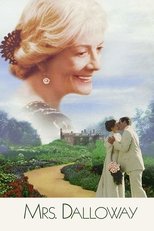CinemaSerf
Jul 17, 2024
6/10
It's the morning of her party, and the eponymous "Clarissa" (Vanessa Redgrave) is a little apprehensive. She's married to a politician (John Standing) who has jilted her for luncheon on this important day, so she sets off to buy some flowers then returns to find she has an unexpected visitor. "Peter" (Michael Kitchen) and she have some history, and as the day unfolds we learn a little of just how that played out thanks to some flashbacks with Alan Cox and Natascha McElhone as their younger selves. These depict the build up to decisions and choices that maybe one, or both, wish now had been made differently. We are also offered a softly dramatised glimpse of the political environment that prevailed in Britain shortly after the end of the Great War. The landed gentry now struggling to maintain their previous degrees of influence, the increasing role of women - the changing political landscape, the end of deference are all woven into the fabric as the party looms and it's hostesss stresses. In parallel, there is the far more interesting storyline developing with a convincing Rupert Graves as the shell-shocked "Septimus Warren Smith". He's returned from the war struggling with any sort of re-adjustment to peacetime life and that's causing considerable distress for his wife (Amelia Bullmore) that isn't really being helped by psychiatrist "Sir William Bradshaw" (Robert Hardy). Generally, this is a grand looking drama featuring an who's who of established British talent, but the effort from Redgrave borders a little on the soporific and aside from the emotionally charged scenes with Graves, the whole pace of the film struggles to get out of second gear as it meanders along offering us a rather lacklustre observation of the lives of people in whom, mostly, I had little interest. It's perfectly watchable and is the kind of film we Brits do well, but it's a bit lightweight on the character front.
